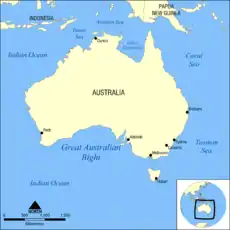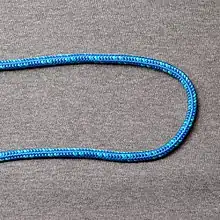bight
English
Etymology
From Middle English bight, biȝt, byȝt (also bought, bowght, bouȝt, see bought), from Old English byht (“bend, angle, corner; bay, bight”), from Proto-Germanic *buhtiz (“bend, curve”), from Proto-Indo-European *bʰūgʰ- (“to bend”). Cognate with Scots bicht (“bight”), Dutch bocht (“bend, curve”), Low German Bucht (“bend, bay”), German Bucht (“bay, bight”), Danish bugt (“bay”), Icelandic bugða (“curve”), Albanian butë (“soft, flabby”) . Compare bought.
Noun
bight (plural bights)

Map of Australia, showing the Great Australian Bight.

A bight (curve in a rope)
- A corner, bend, or angle; a hollow
- the bight of a horse's knee
- the bight of an elbow
- 1905, Robert Louis Stevenson, Travels with a Donkey in the Cévennes, page 166
- I spied a bight of meadow some way below the roadway in an angle of the river.
- An area of sea lying between two promontories, larger than a bay, wider than a gulf
- (geography) A bend or curve in a coastline, river, or other geographical feature.
- A curve in a rope
- 1902, Joseph Conrad, chapter I, in Heart of Darkness:
- I could see every rib, the joints of their limbs were like knots in a rope; each had an iron collar on his neck, and all were connected together with a chain whose bights swung between them, rhythmically clinking.
-
Related terms
- Bight of Benin
- Bight of Biafra
- German Bight
- Great Australian Bight
- New York Bight
Translations
bend
large bay
See also
- Appendix:Parts of the knot
This article is issued from Wiktionary. The text is licensed under Creative Commons - Attribution - Sharealike. Additional terms may apply for the media files.